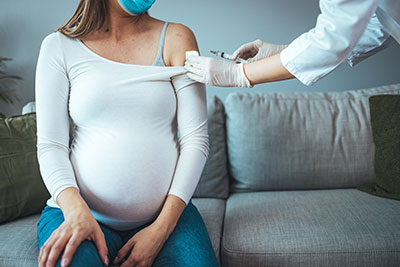Vaccinations During Pregnancy
You probably know that when you are pregnant, you share everything with your baby. That means when you get vaccines, you aren’t just protecting yourself—you are giving your baby some early protection too. You should get a flu shot and whooping cough vaccine (also called Tdap) during each pregnancy to help protect yourself and your baby.

Whooping Cough Vaccine
Whooping cough (or pertussis) can be serious for anyone, but for your newborn, it can be life-threatening. Up to 20 babies die each year in the United States due to whooping cough. About half of babies younger than 1 year old who get whooping cough need treatment in the hospital. The younger the baby is when he or she gets whooping cough, the more likely he or she will need to be treated in a hospital. It may be hard for you to know if your baby has whooping cough because many babies with this disease don’t cough at all. Instead, it can cause them to stop breathing and turn blue.
When you get the whooping cough vaccine during your pregnancy, your body will create protective antibodies and pass some of them to your baby before birth. These antibodies will provide your baby some short-term, early protection against whooping cough.
Flu Vaccine
Changes in your immune, heart, and lung functions during pregnancy make you more likely to get seriously ill from the flu. Catching the flu also increases your chances for serious problems for your developing baby, including premature labor and delivery. Get the flu shot if you are pregnant during flu season—it’s the best way to protect yourself and your baby for several months after birth from flu-related complications.
Flu seasons vary in their timing from season to season, but CDC recommends getting vaccinated by the end of October, if possible. This timing helps protect you before flu activity begins to increase.
COVID-19 Vaccine
Pregnant women have a higher risk of more severe illness from coronavirus (COVID-19) than nonpregnant women. Getting vaccinated may protect you from severe illness. Vaccination also may help protect your fetus. ACOG recommends that all pregnant women be vaccinated against COVID-19. COVID-19 vaccine as well as COVID-19 boosters are safe and recommended during pregnancy at any gestation.
Vaccines and Pregnancy: 9 Things You Need to Know
1. You aren’t just protecting yourself—vaccines during pregnancy give your baby some early protection too!
Did you know a baby can get some disease protection from the mom during pregnancy? Getting flu, Tdap (tetanus, diptheria, and pertussis), and COVID-19 vaccines while you’re pregnant helps your body create protective antibodies (proteins produced by the body to fight off diseases), and you can pass on some of those antibodies to your baby. These antibodies can protect your baby from those diseases during the first few months of life.
2. Flu, Tdap, and COVID-19 vaccination while pregnant can help keep you and your little one safe.
CDC and a panel of experts who make vaccine recommendations have concluded that flu, Tdap, and COVID-19 vaccines are safe for pregnant women and their babies. These experts carefully reviewed the available safety data before recommending any vaccines during pregnancy.
Vaccines, like medicine, can have some side effects. But most people who get vaccinated have mild or no side effects. CDC continually monitors vaccine safety, and the most common side effects may include fever, tiredness, and body aches, as well as redness, swelling, and tenderness at the site where the shot was given.
3. The Tdap vaccine helps protect against whooping cough, which can be really dangerous for your baby. You’ll need a Tdap vaccine during the 27th through 36th week of each pregnancy, preferably during the earlier part of this time period. Tdap helps protect against whooping cough (pertussis), which can be life-threatening for newborns.
About half of babies younger than 1 year old who get whooping cough need treatment in the hospital. The younger a baby is when they get whooping cough, the more likely the baby will need to be treated in a hospital. While some babies cough a lot, other babies with whooping cough don’t cough at all. Instead, it can cause them to stop breathing and turn blue. Siblings, parents, or caregivers who don’t know they have whooping cough can infect babies since the disease often causes mild symptoms in older children and adults.
4. Getting a flu vaccine while pregnant can help protect you and your baby against flu.
Changes in your immune, heart, and lung functions during pregnancy make you more likely to get seriously ill from flu. Getting sick with flu when pregnant can put you at a higher risk of hospitalization and pregnancy complications, such as preterm labor and preterm birth. Flu may also be dangerous for your developing baby. Fever, a common flu symptom, may be associated with neural tube defects and other adverse outcomes.
Additionally, babies are more likely to get very sick from flu. When you get a flu vaccine during pregnancy, you pass antibodies along to your baby that can help protect them from flu in the first few months after they’re born, when they are too young to be vaccinated themselves.
Get a flu shot if you are pregnant during flu season—it’s the best way to protect yourself and your baby from flu. Flu vaccine is safe during pregnancy and can be given during any trimester.
5. Getting a COVID-19 vaccine while pregnant can help protect you from getting very sick from COVID-19.
If you are pregnant or were recently pregnant, you are more likely to get very sick from COVID-19 than people who are not pregnant. Additionally, if you have COVID-19 during pregnancy, you are more likely to have complications that can affect your pregnancy and developing baby.
COVID-19 vaccination is recommended for people who are pregnant, breastfeeding, trying to get pregnant now, or might become pregnant in the future. Evidence shows that COVID-19 vaccination before and during pregnancy is safe and effective and suggests that the benefits of vaccination outweigh any known or potential risks. New data show that vaccination during pregnancy can help protect babies younger than 6 months old from hospitalization due to COVID-19.
People who are pregnant should stay up to date with their COVID-19 vaccines, including getting a COVID-19 booster shot when it’s time to get one.
6. Timing of vaccinations is everything!
You know all about timing. Week after week, you are tracking your baby’s growth and development and counting down the days until you meet your little one! When it comes to vaccines, timing is also important.
- Flu seasons vary in their timing from season to season, but CDC recommends getting your flu vaccine by the end of October, regardless of where you are in your pregnancy. This timing helps ensure that you are protected before flu activity begins to increase.
- Instead of during a specific time of year, CDC recommends you get your Tdap vaccine in your third trimester. Getting Tdap between the 27th and 36th week, preferably during the earlier part of this time period, lets you pass the greatest amount of protective antibodies to your baby before birth. This will help keep your baby protected during their first few months of life when they are most vulnerable to serious disease and complications.
- COVID-19 vaccination is recommended at any point in pregnancy, as well as booster doses for those eligible.
7. Anyone who is around your baby needs vaccines too.
Newborns do not yet have fully developed immune systems, making them particularly vulnerable to infections.
Older kids and adults can spread viruses to babies, even if they don’t feel very sick. Because of this, anyone who is around babies should be up to date on all routine vaccines, including Tdap, flu, and COVID-19 vaccination. This includes parents, eligible siblings, and any other caregivers, like grandparents, nannies, or babysitters. Anyone who needs vaccines should get them at least two weeks before meeting the baby because it takes about two weeks to develop antibodies after vaccination.
8. If you get pregnant again, you’ll need some vaccines again.
The amount of antibodies you have in your body after getting vaccinated decreases over time. When you get a vaccine during one pregnancy, your antibody levels may not stay high enough to provide enough protection for future pregnancies, even if your babies are close in age. So, make sure you give baby number 2 (and 3 and 4…) the greatest amount of protective antibodies and the best disease protection possible by getting your whooping cough vaccine each time you are pregnant. You should also get a flu shot every flu season.
https://www.cdc.gov/vaccines/pregnancy/pregnant-women/need-to-know.html
9. What vaccinations are available at Dubuque OB/GYN?
Dubuque Obstetrics and Gynecology offers the Tdap and influenza vaccine in our office. We DO NOT offer COVID-19 vaccines or boosters.
